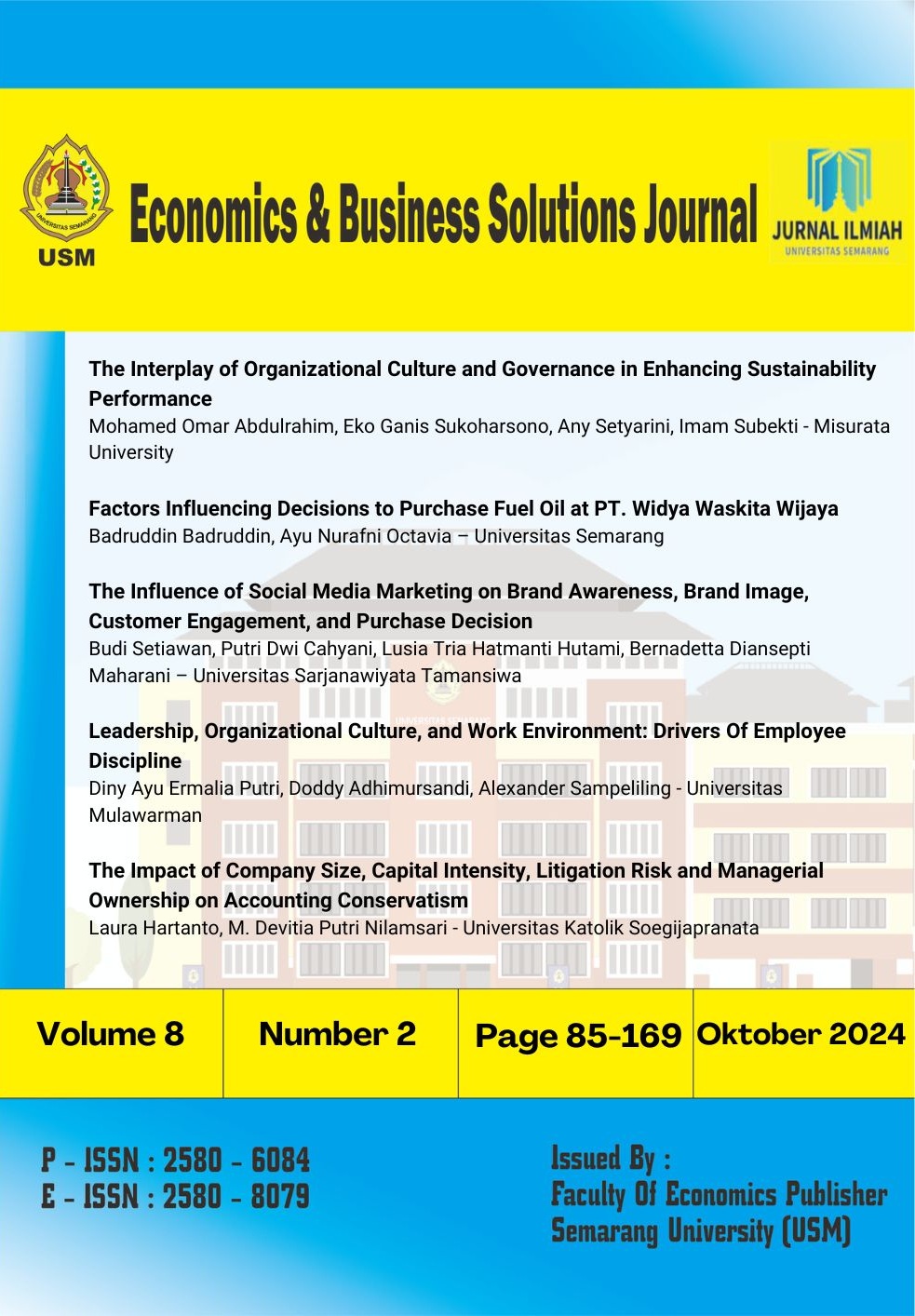The Interplay of Organizational Culture and Governance in Enhancing Sustainability Performance
DOI:
https://doi.org/10.26623/ebsj.v8i2.8988Keywords:
organizational culture, corporate governance, strategic posture, sustainability performance.Abstract
It seems that Indonesia still lacks understanding about the disclosure of sustainability. Furthermore, it is believed that socioeconomic, cultural, governance and environmental challenges are crucial to the success of a business. The influence of corporate governance and organizational culture on sustainability performance, with strategic posture acting as a moderating variable, leads to intriguing issues that warrant further analysis. This study's population consists of all companies listed on the Indonesia Stock Exchange. Purposive sampling is used as a technique in this study. The company's website, which includes information from 2009 to 2018, was sourced from www.idx.co.id and other pertinent sources. Data collection was done, and Warp PLS algorithms were employed for the analysis method. After analyzing and debating the data, the following conclusion was reached: corporate governance and organizational culture greatly impact sustainable performance. When examining the impact of corporate governance and organizational culture on sustainability performance, strategic posture may act as a moderating factorReferences
Agyapong, C. (2021). Does Executive Compensation Dispersion Affect Firm Performance: The Moderating Role of Technology Intensity. Accounting Journal. Volume 1(2).
Alabdullah, T. (2019). Effect of Board Size and Duality on Corporate Social Responsibility: What Has Improved Corporate Governance in Asia? JAS. Volume 3(2).
Alawaqleh, Q. (2021). The Effect of Board of Directors and CEO on Audit Quality: Evidence from Listed Manufacturing Firms in Jordan. The Journal of Asian Finance, Economics and Business, 8(2), 243-253.
Alves, S. (2023). Gender diversity on corporate boards and earnings management: Evidence for European Union listed firms. Cogent Business & Management. Volume 10(1).
Baroroh, N. (2022). The Influence of Company Activities, Growth, and Independent Commissioners on Sustainability Reports With the Type of Industry as a Moderating Variable. Accounting Dynamic Journal. Volume 14(2).
Djalilov, K. (2022). A Contingent Resource-Based Perspective on Corporate Social Responsibility and Competitive Advantage: A Focus on Transition Countries. Business Ethics and Leadership. Volume 6, Issue 1.
Elijido-Ten, E. (2019). Determinants of environmental disclosures in a developing country: applying the stakeholder theory. Paper presented at the Fourth Asia Pacific Interdisciplinary Research in Accounting Conference.
Engel, P. (2019). Voluntary disclosure of individual supervisory board compensation in public family firms. Journal of Business Research. Volume 101, 362-374.
Henseler, J. R., & Sarstedt, M. (2020). I use partial least squares path modelling in advertising research: Basic concepts and recent issues. In Handbook of research on international advertising. Northampton: Edward Elgar.
Iqbal, U. (2022). Environmental innovation and firm value: The moderating role of organizational capital. Journal of Environmental Management. Volume 316(15).
Kusumawardani, A. (2021). Board Structure and Disclosure Of Intellectual Capital: An Empirical Study In An Emerging Market. Journal of Governance and Regulation. Volume 10, Issue 3.
Lawrence, L. T., Thomas. (2019). Sustainability Reporting in ASEAN Countries (Indonesia, Malaysia, Philippines, Singapore and Thailand) (pp. 1-56).
Lusmeida, H. (2023). The Corporate Governance Moderates Determinants Affecting Sustainability Report Disclosure. Accounting Journal. Volume 27(3).
Mahfouz, M. (2020). Linking organizational culture with firm financial performance: A literature review. Bussecon Review of Social Sciences. Volume 2(1).
Nasution, A. (2024). The Effect Of Corporate Board And Ownership Structure On Financial Performance. Accounting Journal. Volume 1(2).
Ong, T. S., Teh, B. H., & Lee, A. S. (2019). Contingent Factors and Sustainable Performance Measurement (SPM) Practices of Malaysian Electronics and Electrical Companies. Sustainability, 11(4), 1058.
Shan, G. (2019). Related party disclosures in China: influences of factors identified from agency, legitimacy, and signalling theories. Paper presented at the Symposium SA, Adelaide. http://www. symposiums. org/Shan% 20_2008_.
Sullivan, K. (2019). Sustainability Disclosure: Getting Ahead of the Curve. Deloitte, Development LLC.
Tanui, P. (2022). Ownership Structure and Corporate Sustainability Disclosure in Kenya: Interaction Effect of Board Gender Diversity. International Journal of Finance Research. Volume 3(4).
Taufik, M. (2021). The Influence of the BOD`s characteristics toward corporate social responsibility: Study non-financial and financial firms in Indonesia. Accounting and Journal Auditing. Volume 25(2).
Thoumrungroje, A., & Tansuhaj, P. (2019). Entrepreneurial strategic posture, international diversification, and firm performance. Multinational Business Review, 13(1), 55-73.
Trireksani, T., & Djajadikerta, H. G. (2020). Corporate governance and environmental disclosure in the Indonesian mining industry. Journal Economic. Volume 1(3)
Ullmann, A. A. (2020). Data searching for a theory: A critical examination of the relationships among social performance, social disclosure, and economic performance of US firms. Academy of Management Review, 10(3), 540-557.
Venkatraman, N. (2019). The concept of fit in strategy research: Toward verbal and statistical correspondence. Academy of Management Review, 14(3), 423-444.
Wijayati, N., Hermes, N., & Holzhacker, R. (2019). Chapter 10: Corporate Governance and Corruption: A Comparative Study of Southeast Asia. USA, New York Springer International Publishing Switzerland
Zaid, M. (2020). Ownership structure, stakeholder engagement, and corporate social responsibility policies: The moderating effect of board independence. Corporate Social Responsibility and Environmental Management. Volume 27, Issue 3 p. 1344-1360.
Downloads
Published
Issue
Section
License
The journal holds the copyright for each article published with work licensed simultaneously under a Creative Commons Attribution 4.0 International License, which allows others to share the work with an acknowledgment of the authorship and early publication of the work in this journal.







